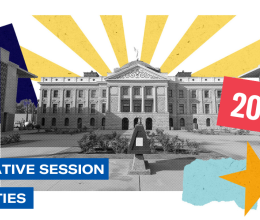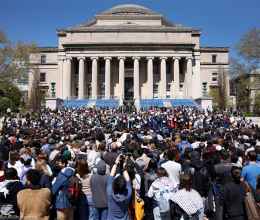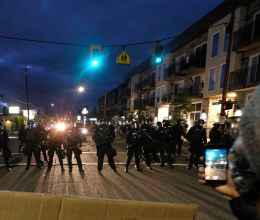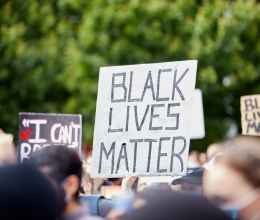
Following the tragic school shooting in Parkland, Florida, students across the nation have come together to fight for gun reform. They have decided they can no longer sit still while reform efforts fail and school shootings become increasingly normal.
Many school administrators, however, have attempted to stop students from participating in constitutionally protected protests by threating disciplinary action. Intimidation by administrators often includes misleading—and sometimes blatantly inaccurate—statements about students’ rights.
Just a few days ago, the American Civil Liberties Union of Michigan sent a letter to the Utica Academy for International Students urging school officials to halt their enforcement of a rule that banned students from holding “political” signs during protests. The Michigan ACLU encouraged the principal to apologize to students who were suspended for participating in demonstrations against gun violence.
More than 50 years ago, the Supreme Court ruled that students may express political speech as long as they do not disrupt the educational process. The U.S. Constitution clearly protects student speech, but school officials still try to silence their voices.
Tomorrow, April 20, is the anniversary of the Columbine High School massacre. Across the nation, students are organizing protests and walkouts in order to bring more attention to gun violence, and, once again, school officials are attempting to regulate their activism.
For instance, last week, Great Hearts North Phoenix Preparatory, a public charter school, sent a letter to parents informing them of the school’s plan for tomorrow. Headmaster Paul Weinhold, who signed the letter, said that he collaborated with “student representatives” to plan a moment of “peaceful, silent remembrance” that is “civil and not politicized.”
In the letter, Weinhold writes, “[students] understood that our Academy is a public, non-sectarian institution serving a variety of Arizonans, and so any action on their part could not espouse a particular political perspective.” Weinhold’s claim that students cannot express specific political beliefs is simply false.
The claim that students cannot express specific political beliefs is simply false.
Great Hearts students, indeed all public school students, can advocate any political belief they want without fear of punishment—as long as they do not disrupt the functioning of the school or violate content-neutral school policies (like a blanket prohibition on wearing hats in the classroom). Inaccurate statements like Weinhold's can have the effect of silencing students from using their constitutionally protected voices.
Weinhold further claims that what Great Hearts North Phoenix Prep students “really desired” is a “moment of silence remembrance.” That begs the question: What do the students who were not included in the collaboration with school administrators think?
For those public school students who wish to participate in protests that their schools did not sanction, you should know a few things about your constitutional rights. Here are some tips from the ACLU:
- You do not lose your right to free speech when you walk into school. You have the right to speak out, hand out flyers and petitions, and wear expressive clothing in school. As mentioned previously, you have the right to express yourself in school without fear of punishment as long as you do not disrupt the functioning of the school or violate the school’s content-neutral policies. Schools cannot punish you simply because they disagree with your beliefs or if they think your speech is controversial.
- Your school can punish you if you miss class to participate in a protest or walkout. But they cannot punish you more severely than they punish anyone else who misses class for any other reason. The punishment for missing class varies from school to school, so make sure to read the punishment policies of your school before you miss class. Additionally, all students should be given the same opportunity to make up work regardless of the reason for the absence.
- If you decide to make your voice heard outside of school, you have essentially the same free speech rights as anyone else. Your school should not be able to punish you for speaking your mind off campus and outside of school hours. You have free speech rights on social media, too. Your school cannot punish you for what you post on social media if you are off campus, outside of school hours, and the content does not relate to school.
Protesting tomorrow? The ACLU wants to know how your school responds. Let the ACLU know here.
The ACLU also has more Know Your Rights resources for students. Check some of them out below:
- Students’ Rights: Speech, Walkouts and Other Protests
- Students: Know Your Rights!
- Can Schools Discipline Students For Protesting?
- Know Your Rights: Students’ Free Speech Rights In Public Schools
- Student Rights at School: Six Things You Need To Know
- Tinker V. Des Moines (1965)
-
Know Your Rights: What to Do if Your Rights are Violated at a Demonstration or Protest
-
Know Your Rights: A Manual for Arizona Public School Students (PDF)



